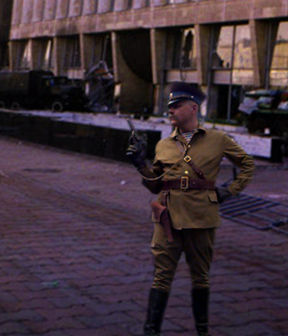"Sword of Tamerlane" Mystery Clouds Appointment of New ROTC Commandant

Colonel Bratchenko warding away members of the international press from the battle for the Ostankino television center in Moscow on October 4, 1993.
A career soldier, Colonel Bratchenko has spent nearly thirty years in uniform. Born in Nichevograd, in the Don Cossack region of Russia in 1934, the son and grandson of Russian Cossack officers, he graduated from the Suvorov Cadet Academy in Leningrad, (now St. Petersburg) and joined the Red Army of the now-defunct Union of Soviet Socialist Republics (USSR) in 1956. His first assignment took him to Budapest, in Hungary. Further assignments to East Germany, Warsaw, and Prague culminated in his being promoted to full colonel and given command of a Motor-Rifle Regiment in Kabul in April of 1981. Soon after, he received the Order of Aleksander Nevsky by then-Soviet Premier Leonid Brezhniv and the subsequent award of Hero of the Soviet Union, 3rd Class, by Yuri Andropov in 1985. In 1989, Colonel Bratchenko's actions against an uprising by pro-communist military officers in Moscow earned him the Hero of the Soviet Union, 1st Class from the last Soviet Premier, Mikhail Gorbachev.
Bratchenko's most intriguing assignment, however, was leading a 1984 military-archeological expedition into then-Soviet Georgia to recover the so-called "Sword of Tamerlane".
Tamerlane, or Timur the Great, was born in 1336, a member of the Barslas, a Turkish Mongol tribe which had converted to Islam. By 1370, Tamerlane, a renowned warrior, began consolidating his power among the various nomadic tribes of Central Asia by conquering the entire region. By the end of his life in 1405, after 35 years of campaigns and wars that left hundreds of thousands dead and enslaved, he had successfully defeated Ottoman Turks, Hindus, The Golden Horde, and other peoples and controlled an empire stretching from the Aegean to the River Ganges and threatened the trembling Kingdoms of Europe and the Eastern Roman Empire.
In 1941, on the orders of Soviet Dictator Stalin, a team from the Soviet Academy of Science in Moscow ventured into the mountains of Georgia in an attempt to locate the tomb of the Great Tamerlane with orders to recover the remains and any artifacts---notably Tamerlane's sword which reputedly confered mystical powers and military invincibility on whomever possessed it.
Upon finding the tomb the archeologists encountered a dire inscription guarding the entryway, which, when translated, read: "He whomsoever shall disturb the earthly resting place of Timur-i-Lenk (Tamerlane), then his country shall suffer such terrible retribution as the Hand of Allah shall visit upon it."
Ignoring the dreadful warning, the archeologists opened the tomb. By a quirk of fate, this happened on the morning of June 21, 1941, at the very moment Nazi Germany launched Operation Barbarossa---the invasion of the USSR. Although the remains of the Great Tamerlane, along with other artifacts, were recovered and returned to Moscow, the team searched in vain for the sword. According to reports, the team failed to recover the sword at the time, although unsubstantiated rumors speak of "hideous deaths" among the military escort when the team got close to the resting place of the sword.
The German invasion suspended other expeditions until after 1945 when Stalin became increasingly obsessed with imaginary plots against his life. Only well after the dictator's death in 1953 did efforts to recover the sword begin anew. In 1983, when the faltering Soviet regime faced defeat in Afghanistan, the Red government under Chernenko saw the legendary weapon as a means of reversing the course of history.
Unconfirmed reports reached U.S. and NATO intelligence agencies in 1985 and '86 about another expedition to find the sword. At first, these were dismissed as merely lunatic fringe stories and supermarket tabloid headlines as in The National Star Inquiry. But in 1989, this author, while serving as Military Attaché at the U.S. Embassy in Moscow, had the opportunity to meet Colonel Bratchenko. When asked about the expedition, Colonel Bratchenko, unofficially confirmed that he had been detached from his Motor Rifle Regiment and sent to then-Soviet Georgia, to recover bodies of Red Army soldiers who died in an "unfortunate accident" during the 1941 expedition.
"The remains looked as if they died a most unpleasant death," said Colonel Bratchenko. "After forty-three years, it is likely animals disturbed them--- but it is difficult to say."
When pressed about the Sword's recovery, Colonel Bratchenko, in keeping with the paranoid Soviet attitude toward security at the time, merely said, "Perhaps, Colonel Campbell, when the weather is warmer, I will tell you more."
The reaction of officials at the University of Emmetsburg to Colonel Bratchenko's appointment varied from glowing to grim.
"We expect Colonel Bratchenko to revitalize our ROTC esprit and work closely with Captain Hans Lighthooves to resurrect the old horse-mounted drill team," said University President Neville Angstrum. "Why, already, Colonel Bratchenko has acquired, through his contacts in the Russian Army, twelve T-72 main battle tanks, five BRMDs, and five Mil MI-24 Hind helicopters. Now how many ROTC programs in this country can boast that kind of hardware for the training of our country's future officers? This is a definite feather in the cap of the University of Emmetsburg, especially given the black eye from the recent student unrest over the so-called Black 11 controversy."
But Graduate Student and new Acting Assistant Temporary Vice-President Pro-Tem, Hilton Engels said "Bratchenko is a counter-revolutionary, reactionary. By disparaging the Great Stalin, he shows that he is a fascist-imperialist running-dog wholly ignorant of the great historical dialectic and a class enemy. I refuse to accept his appointment, and shall encourage the soldier-proletarians of the imperialist ROTC to create a soldiers' soviet to overthrow this traitor to the class struggle and the working man!"
Colonel Bratchenko has promised this author a further interview where---perhaps---the fate of the "Sword of Tamerlane" may be revealed.
Back to this Issue Contents
